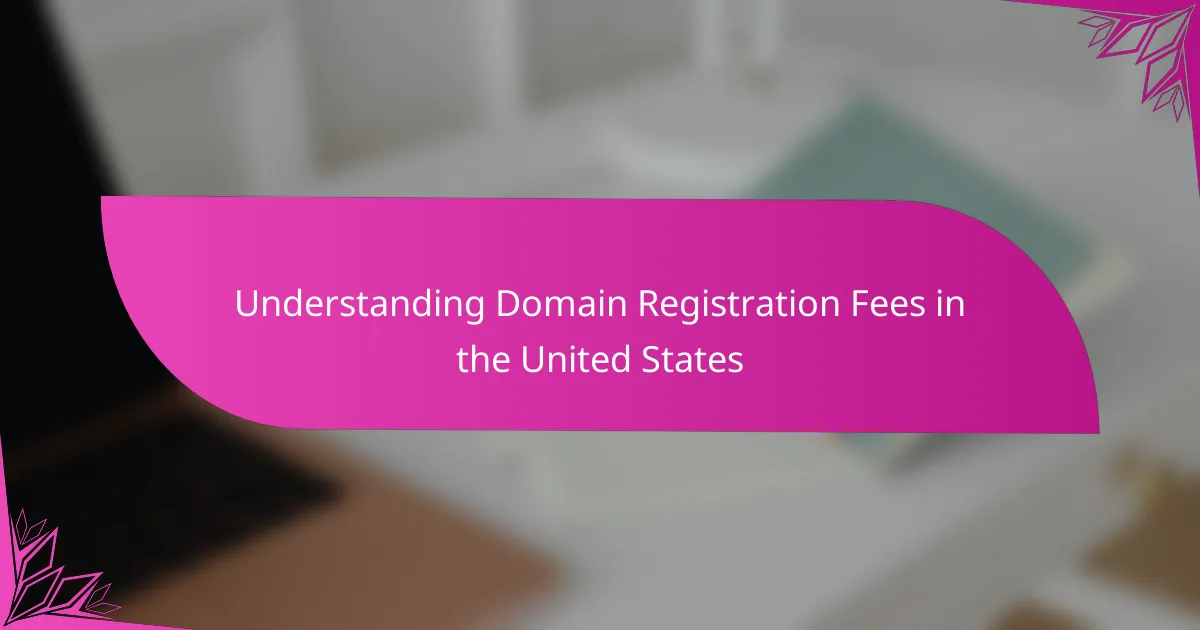In Canada, domain registration fees typically range from $10 to $50 per year, influenced by factors such as the domain extension and the registrar. By understanding these costs and comparing different registrars, you can effectively budget for your online presence and make informed decisions about your domain purchase.
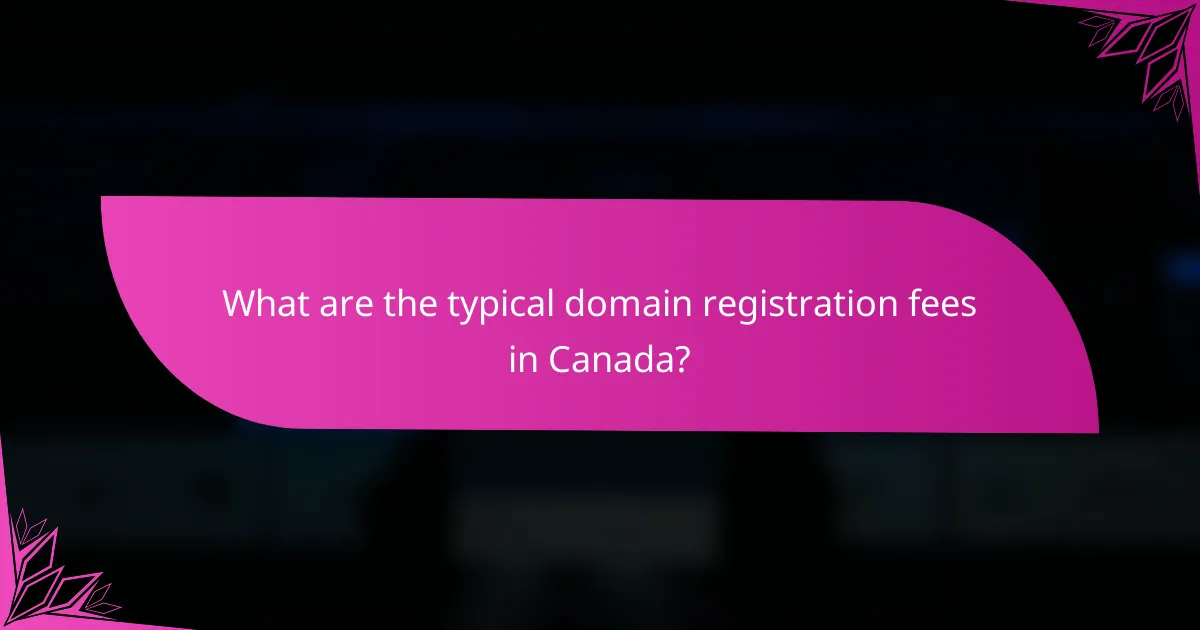
What are the typical domain registration fees in Canada?
In Canada, domain registration fees generally range from $10 to $50 per year, depending on various factors such as the domain extension and the registrar. Understanding these costs can help you budget effectively for your online presence.
Standard registration costs
Standard domain registration costs typically fall between $10 and $20 annually for common extensions like .com, .net, and .org. These fees can vary based on the registrar you choose, as some may include additional services like privacy protection or email forwarding.
When selecting a registrar, consider their reputation and the services they offer. Some registrars may have promotional rates for the first year, so always check the renewal prices as well.
Premium domain pricing
Premium domains, which are often short, memorable, or keyword-rich, can cost significantly more, sometimes ranging from hundreds to thousands of dollars. The price reflects their perceived value and demand in the market.
When considering a premium domain, evaluate its potential return on investment. A strong domain can enhance branding and improve search engine visibility, making it worthwhile despite the higher upfront cost.
Renewal fees
Renewal fees for domains can differ from initial registration costs, often ranging from $10 to $30 per year. It’s crucial to check the renewal rates when you first register, as some registrars may offer low initial prices but higher renewal fees.
Be aware of any grace periods for late renewals, as losing a domain can have significant consequences for your online presence. Set reminders for renewal dates to avoid lapsing on your domain ownership.
Transfer fees
Transferring a domain to a different registrar usually incurs a fee, typically between $5 and $20. This fee often includes a one-year extension of your domain registration.
Before transferring, ensure that your domain is eligible for transfer and that you have unlocked it with your current registrar. Familiarize yourself with the transfer process to avoid any disruptions to your domain service.
Discounted rates for bulk purchases
Many registrars offer discounted rates for bulk domain registrations, which can significantly lower the per-domain cost. Discounts may apply when purchasing multiple domains at once, often reducing the price to the low teens or even less per domain.
If you plan to register several domains, research registrars that provide bulk pricing options. This can be a cost-effective strategy for businesses or individuals looking to secure multiple online identities.
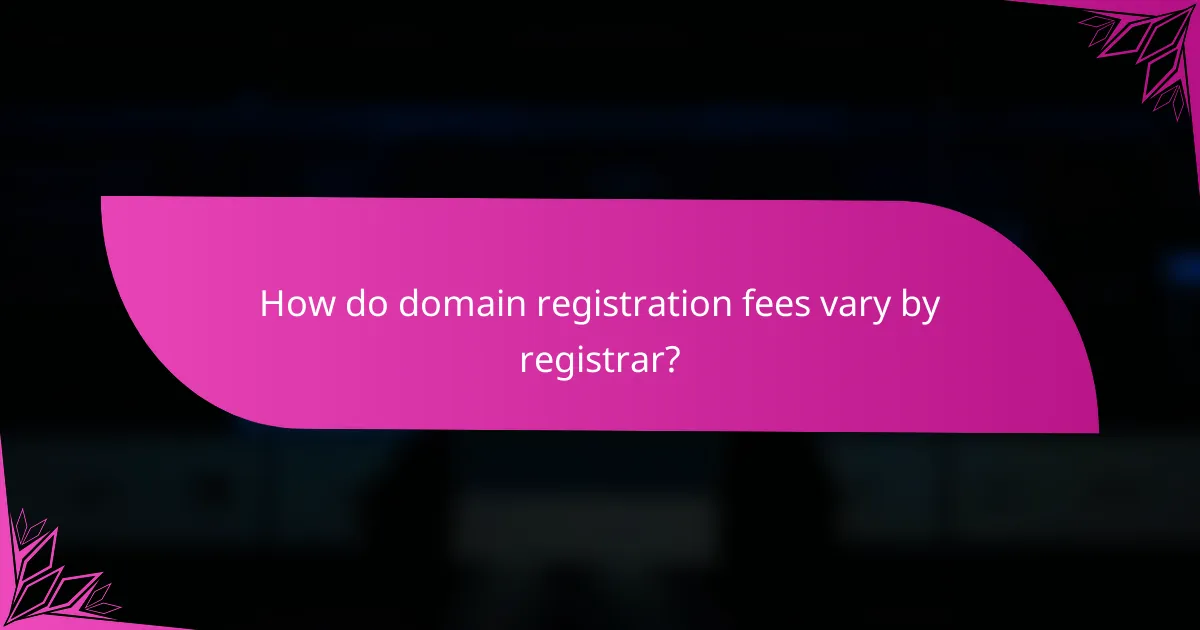
How do domain registration fees vary by registrar?
Domain registration fees can differ significantly among registrars based on factors like pricing structures, renewal rates, and additional services. It’s essential to compare these fees to find the best option for your needs, as some registrars may offer lower initial costs but higher renewal fees or limited features.
GoDaddy pricing structure
GoDaddy typically offers competitive initial registration fees, often in the low to mid-tens of dollars for standard domains. However, their renewal rates can be higher, sometimes exceeding the original price by a significant margin. It’s advisable to review their pricing tiers and any promotional offers before committing.
Additionally, GoDaddy provides various add-ons such as privacy protection and website hosting, which can increase the overall cost. Be sure to assess whether these extras are necessary for your domain management.
Namecheap fee comparison
Namecheap is known for its affordable domain registration fees, often starting in the low tens of dollars. Their renewal rates are generally more stable compared to some competitors, making them a reliable choice for long-term ownership. They also frequently run promotions that can lower initial costs further.
Moreover, Namecheap includes free WHOIS privacy protection with many of its domains, which can save you additional expenses. This feature helps keep your personal information private, a crucial consideration for many domain owners.
Bluehost domain costs
Bluehost offers domain registration as part of its web hosting packages, which can be an attractive option for those looking to build a website. Their domain fees typically range from the low to mid-tens of dollars, especially when bundled with hosting services.
However, it’s important to note that if you choose to register a domain separately, the costs may vary. Always check the renewal rates and any potential fees for transferring your domain away from Bluehost if you decide to change hosting providers later.
Google Domains pricing
Google Domains provides a straightforward pricing model, with domain registration fees usually in the mid-tens of dollars. Their renewal rates are consistent with the initial registration costs, which is a significant advantage for budget-conscious users.
Google Domains also offers features like free privacy protection and easy integration with other Google services, making it a convenient choice for those already using the Google ecosystem. Consider these benefits when evaluating your options for domain registration.
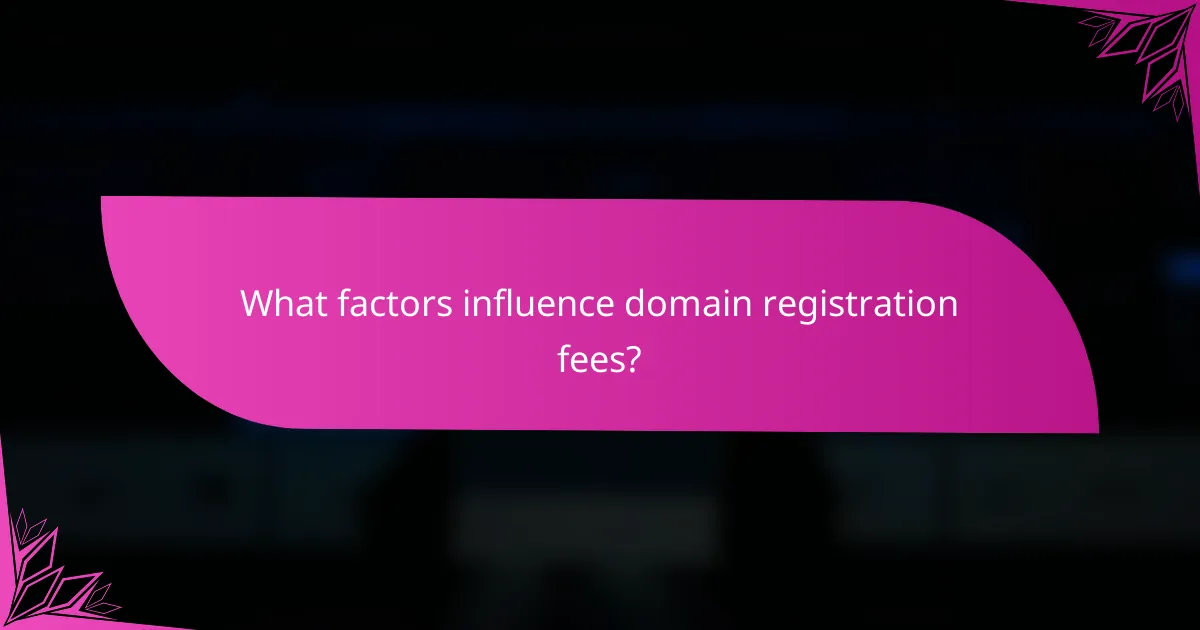
What factors influence domain registration fees?
Domain registration fees in Canada are influenced by several key factors, including the type of domain extension, the popularity of the domain name, and the services offered by the registrar. Understanding these elements can help you make informed decisions when purchasing a domain.
Domain extension impact
The domain extension, or top-level domain (TLD), significantly affects registration fees. Common extensions like .com or .net typically have lower fees, often ranging from $10 to $20 per year. In contrast, specialized or newer TLDs, such as .tech or .design, can cost considerably more, sometimes exceeding $50 annually.
Additionally, some country-code TLDs (ccTLDs) may have unique pricing structures based on local regulations or demand. For example, a .ca domain might have different fees compared to a .co.uk domain.
Domain popularity and demand
The popularity and demand for specific domain names can drive up registration costs. Highly sought-after names, particularly those with common keywords or short character lengths, may command premium prices. Some domains can be priced in the hundreds or thousands of dollars, especially if they are considered brandable or have existing traffic.
When evaluating a domain’s potential cost, consider using domain auction sites or marketplaces to gauge current demand and pricing trends. This can provide insights into whether a name is a good investment.
Registrar service offerings
Different registrars offer varying services that can impact the overall cost of domain registration. Basic registration may be inexpensive, but additional features like privacy protection, email hosting, and website builders can increase the total price. Some registrars include these services for free, while others charge extra.
When choosing a registrar, compare their service packages and consider what features are essential for your needs. Look for registrars that provide transparent pricing and avoid hidden fees to ensure you get the best value for your domain registration.
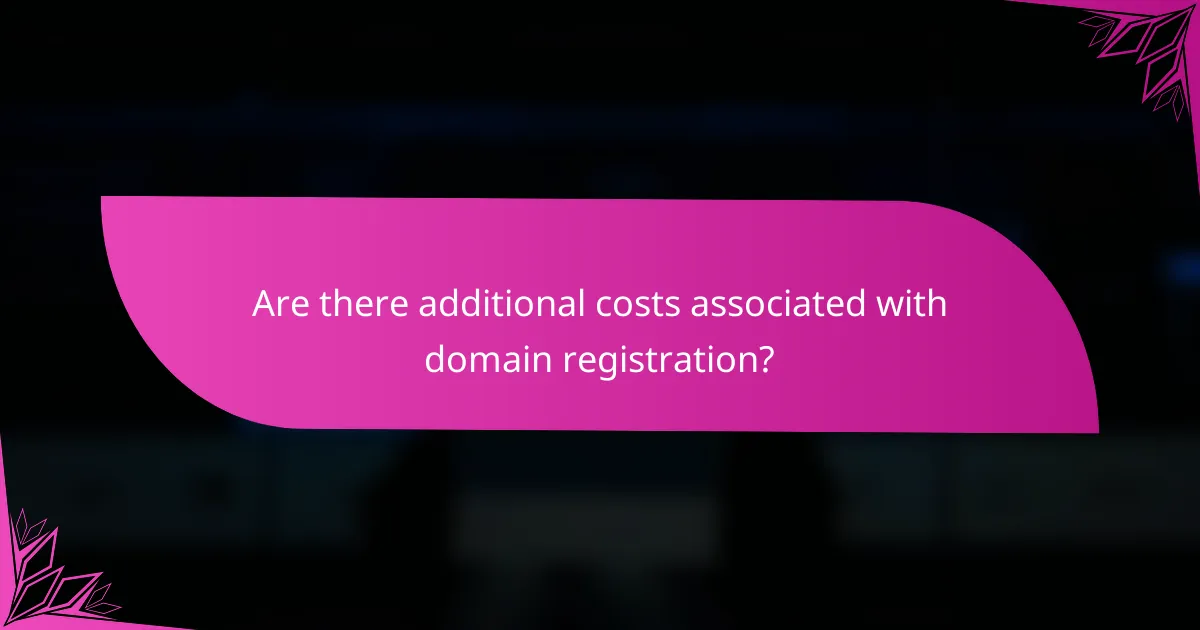
Are there additional costs associated with domain registration?
Yes, there are several additional costs associated with domain registration beyond the initial fee. These can include privacy protection, hosting services, and SSL certificates, each contributing to the overall expense of maintaining a domain.
Privacy protection fees
Privacy protection fees, often referred to as WHOIS privacy, help keep your personal information confidential in the public WHOIS database. This service typically costs between $5 to $15 per year, depending on the registrar.
When you register a domain, your name, address, phone number, and email are publicly accessible unless you opt for privacy protection. This service is recommended to prevent spam and unwanted solicitations.
Hosting service costs
Hosting service costs are essential for making your website accessible on the internet. Depending on the type of hosting you choose—shared, VPS, or dedicated—you can expect to pay anywhere from $3 to over $100 per month.
It’s crucial to select a hosting plan that meets your website’s needs. Shared hosting is often the most affordable option for small sites, while larger businesses may require more robust solutions like VPS or dedicated servers.
SSL certificate expenses
SSL certificates are vital for securing data exchanged between users and your website, especially if you handle sensitive information. The cost of SSL certificates can range from free options provided by some hosting services to several hundred dollars per year for premium certificates.
Investing in an SSL certificate not only enhances security but also boosts your site’s credibility and can improve search engine rankings. Many hosting providers offer SSL certificates as part of their packages, so it’s worth checking for bundled deals.
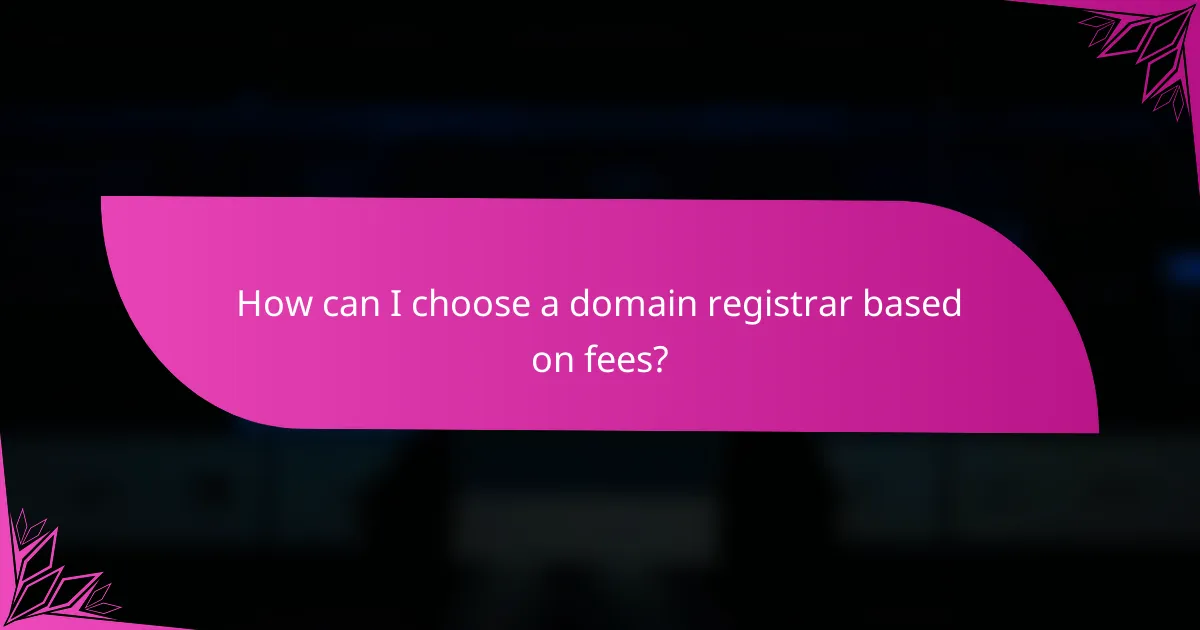
How can I choose a domain registrar based on fees?
Choosing a domain registrar based on fees involves comparing the costs associated with registration, renewal, and additional services. Look for registrars that offer transparent pricing and avoid hidden fees to ensure you get the best value for your investment.
Comparative fee analysis
When analyzing domain registration fees, consider both the initial registration costs and the renewal fees, which can vary significantly. Many registrars offer promotional rates for the first year, often ranging from $10 to $20, but renewal prices may increase by 50% or more. Always check the registrar’s pricing structure for any additional costs, such as transfer fees or charges for privacy protection.
It’s also wise to compare the features included with the registration fee. Some registrars may offer free email forwarding, DNS management, or website hosting, which can add value to your choice. Create a simple comparison table to evaluate these features alongside the costs.
Customer service considerations
Customer service is a crucial factor when selecting a domain registrar, as issues can arise at any time. Look for registrars that provide 24/7 support through multiple channels, such as phone, chat, and email. A responsive support team can save you time and frustration if you encounter problems with your domain.
Additionally, consider the availability of resources like knowledge bases or community forums. These can be helpful for troubleshooting common issues without needing direct support. Reading customer reviews can also give insight into the quality of service provided by different registrars.
